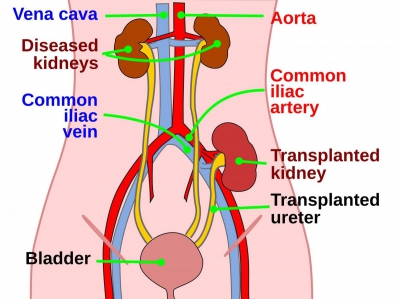John Hartwell Harrison (February 16, 1909 January 20, 1984) was an American urologic surgeon, professor, and author. He performed the first human organ removal for transplant to another. This was a pivotal undertaking as a member of the medical team that accomplished the worlds first successful kidney transplant. The team conducted its landmark transplant between identical twins in 1954.
Harrison was a descendant of the Harrison family of Virginia. He was educated there and in Ohio prior to completing his medical training and taking up practice in Boston, Massachusetts; he specialized in urology at the Brigham and Womens Hospital.
Harrison taught surgery at nearby Harvard University, where he also contributed as a textbook editor and produced urological monologues. He died at age 74 of bladder cancer.
Kidney transplant or renal transplant is the organ transplant of a kidney into a patient with end-stage kidney disease (ESRD). Kidney transplant is typically classified as deceased-donor (formerly known as cadaveric) or living-donor transplantation depending on the source of the donor organ. Living-donor kidney transplants are further characterized as genetically related (living-related) or non-related (living-unrelated) transplants, depending on whether a biological relationship exists between the donor and recipient.
Before receiving a kidney transplant, a person with ESRD must undergo a thorough medical evaluation to make sure that they are healthy enough to undergo transplant surgery. If they are deemed a good candidate, they can be placed on a waiting list to receive a kidney from a deceased donor. Once they are placed on the waiting list, they can receive a new kidney very quickly, or they may have to wait many years; in the United States, the average waiting time is three to five years. During transplant surgery, the new kidney is usually placed in the lower abdomen (belly); the person's two native kidneys are not usually taken out unless there is a medical reason to do so.People with ESRD who receive a kidney transplant generally live longer than people with ESRD who are on dialysis and may have a better quality of life. However, kidney transplant recipients must remain on immunosuppressants (medications to suppress the immune system) for the rest of their life to prevent their body from rejecting the new kidney. This long-term immunosuppression puts them at higher risk for infections and cancer. Kidney transplant rejection can be classified as cellular rejection or antibody-mediated rejection. Antibody-mediated rejection can be classified as hyperacute, acute, or chronic, depending on how long after the transplant it occurs. If rejection is suspected, a kidney biopsy should be obtained. It is important to regularly monitor the new kidney's function by measuring serum creatinine and other labs; this should be done at least every three months for the rest of the person's life.In 2018, an estimated 95,479 kidney transplants were performed worldwide, 36% of which came from living donors. The first successful kidney transplant was performed by Joseph Murray in 1954; Murray was awarded the Nobel Prize in Physiology or Medicine in 1990 for his work in organ transplantation.

1954Dec, 23
First successful kidney transplant is performed by J. Hartwell Harrison and Joseph Murray.
Choose Another Date
Events on 1954
- 13Feb
NCAA Division I
Frank Selvy becomes the only NCAA Division I basketball player ever to score 100 points in a single game. - 28Feb
NTSC
The first color television sets using the NTSC standard are offered for sale to the general public. - 1Apr
United States Air Force Academy
United States President Dwight D. Eisenhower authorizes the creation of the United States Air Force Academy in Colorado. - 25Apr
Bell Labs
The first practical solar cell is publicly demonstrated by Bell Telephone Laboratories. - 18Jun
1954 Guatemalan coup d'état
Carlos Castillo Armas leads an invasion force across the Guatemalan border, setting in motion the 1954 Guatemalan coup d'état

 English
English  español
español  français
français  português
português  русский
русский  العربية
العربية  简体中文
简体中文 